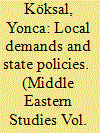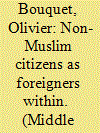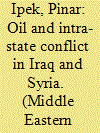|
|
|
Sort Order |
|
|
|
Items / Page
|
|
|
|
|
|
|
| Srl | Item |
| 1 |
ID:
151863


|
|
|
|
|
| Summary/Abstract |
Qajar dynasty painting began in the reign of Fath-Ali Shah (1797–1834) and ended with the death of Naser al-Din Shah (1831–1896). In this period, art was influenced by the government; new rules assigned to art as to sociopolitical conditions and figurative paintings were exploited as a tool in governing the country. In the paintings ascribed to Fath-Ali Shah's period, women also appear alongside the images of men who were principally historical, political and religious key figures of their own time. The significant status of women was the most important factor in this. These images were not merely limited to eminent characters as musicians, dancers, servants, acrobats images were drawn as delicately and magnificently as male images and even enjoyed better radiance, vivacity, pep, variety and tonality than them. Male images were elegantly drawn in formal costumes, often with the same composition. The similarities and differences of male and female images in Qajar paintings can be assessed according to the criteria of composition, colour, positioning, and the number of figures, assimilation, the intricacies and the degree of characterization. This study also stresses the characteristics of men's and women's images in the paintings.
|
|
|
|
|
|
|
|
|
|
|
|
|
|
|
|
| 2 |
ID:
151869


|
|
|
|
|
| Summary/Abstract |
By comparing the decisions of various meetings of the General Councils of Edirne and Ankara provinces from 1283 to 1288 (1867–1872 AD), this study analyses social and economic dynamics of both provinces, the state vocabulary for handling local demands, and the boundaries of responsibility for the state and the local actors in provincial administration. Instead of reading the Tanzimat as a top-down imposition, this article defines General Councils as sites of negotiations between state and local actors and instruments for local development. This article challenges the conventional view of provincial councils as weak and unable to implement various policies. It contributes to a new generation of studies that challenges the separation between state and social forces and looks at how both interacted in provincial administration.
|
|
|
|
|
|
|
|
|
|
|
|
|
|
|
|
| 3 |
ID:
151870


|
|
|
|
|
| Summary/Abstract |
Since the establishment of the Republic in 1923, any non-Muslim born in Turkey, whatever his/her religion, is a Turkish citizen as are any of his/her Muslim fellows. However, sometimes he/she might consider him/herself an alien and might even be regarded as such by the official authorities. The purpose of this article is to shed light on this reality from an historical perspective. Based on the comparison of two terms (ecnebi and yabancı, both meaning foreigner) that had become frequently used during the last Ottoman decades, the analysis establishes to what degree ecnebi was replaced by yabancı in official republic terminology. The article argues that this change might be related to the formation of less visible categories of foreigners that partly originated from the confessional imperial framework based on the differentiation between Muslims and non-Muslims. Far from being set aside as the Kemalists have long claimed, this framework has prevailed. It partly explains to what extent, as a result, in the history of the Turkish Republic, non-Muslim Turkish citizens have sometimes been regarded as ‘foreigners within’ (içerdeki yabancı).
|
|
|
|
|
|
|
|
|
|
|
|
|
|
|
|
| 4 |
ID:
151862


|
|
|
|
|
| Summary/Abstract |
The continuing dependency on fossil fuels of the Middle East not only in Turkey's energy mix but also in world energy demand requires further analysis of oil and conflict in the region since the fall of Mosul in Iraq to the Islamic State of Iraq and Syria in June 2014. This article addresses the relationship between oil and conflict. Then, it examines the case of Turkey's increasing energy relations with the Kurdistan Regional Government to elucidate the implications of inter-state and intra-state conflict on regional interdependence in the region. The argument asserts that risks of an abrupt regime change or revolutionary regime formation in the aftermath of civil war in Syria and ethnic or sectarian violence in Iraq, which are highly associated with intra-state conflicts, present challenges for Turkey's energy security and most importantly for human security in the region.
|
|
|
|
|
|
|
|
|
|
|
|
|
|
|
|
| 5 |
ID:
151859


|
|
|
|
|
| Summary/Abstract |
When Recep Tayyip Erdoğan, as the Prime Minister of the Turkish Republic, declared his government's intention to raise a ‘religious generation’, his proposition drew harsh criticisms from Turkey's secularists, who argued that doing so would clearly challenge the secular nature of the Turkish state. Yet it may come as a surprise to many that it was not a conservative party with Islamist leanings that first experimented with the idea of relying on religious education as an antidote to the perceived moral decadence of the society. Rather, it was the secularist party, the Republican People's Party, which attempted to use religious instruction for the same purpose during the heyday of Kemalism in the 1940s. Against this backdrop, providing an analysis of how the Republican People's Party had come to the point of offering religious education to school children and how it justified this policy can shed light on today's debate on secularism and the secular character of the Turkish state.
|
|
|
|
|
|
|
|
|
|
|
|
|
|
|
|
| 6 |
ID:
151861


|
|
|
|
|
| Summary/Abstract |
When Hüseyin Hilmi Pasha (1855–1918) was appointed as the Inspector General for the Rumelian Provinces (Vilâyât-ı Selâse Umûm Müfettişi) in November 1902, his eligibility for such a position was questioned by some of his contemporaries. This article aims to reconstruct and understand the path that led this statesman, from the very beginning of his career, towards the inspectorate during the time of Sultan Abdulhamid II (r. 1876–1909). Hüseyin Hilmi Pasha began his bureaucratic life in Midilli (Lesbos Island) in 1874, and he was very fortunate to encounter Namık Kemal and become his protégé. Apart from his early career, he mainly served in the southern Anatolian and Syrian regions of the empire, and later in Yemen. However, these regions were afflicted with similar problems, a fact that helped Hüseyin Hilmi Pasha evolve into a ‘crisis management expert’. The experiences he gained at each post opened the door for the next one, thus transforming him into a prominent statesman of the Hamidian administration and ultimately enabling him to reach the inspectorate of Rumelia.
|
|
|
|
|
|
|
|
|
|
|
|
|
|
|
|
| 7 |
ID:
151865


|
|
|
|
|
| Summary/Abstract |
In 1819, the American Board of Commissioners for Foreign Missions (ABCFM) began a mission in the Middle East. Though initially the missionaries sought to convert Muslims and Jews to the Christian faith, they soon turned to revitalizing their co-religionists. This puzzling situation of Christians proselytizing other Christians occurred because the two groups of Christians, American and Middle Eastern, held very different cultural and political notions of what that identity meant. In the end, the American mission remained minimally effective at conversion but influential in its secular goals of educating, furthering religious freedom, and modernization. Counter-intuitively, the missionaries’ religious proselytizing became implicated in a kind of secularization.
|
|
|
|
|
|
|
|
|
|
|
|
|
|
|
|
| 8 |
ID:
151858


|
|
|
|
|
| Summary/Abstract |
In the mid-nineteenth century pan-Slavic ideology was evident at two levels: at the personal level in N.P. Ignatiev's diplomacy, and at the institutional level in the Slavic Benevolent Committee's activities. Both served to spread Russian influence among the Slavic Orthodox subjects of the Ottoman Sultan. The Russian Archives contain a wealth of material related to the Slavic Benevolent Committee and Ambassador N.P. Ignatiev's activities concerning Russia's Balkan policy. The memoirs of the Russian and Ottoman bureaucratic elites also offer great detail on the subject. Relying upon these archival sources and memoirs, this article aims to discuss the transformation of pan-Slavic ideology from a cultural organization into a Russian political asset, with special attention to N.P. Ignatiev and the Slavic Benevolent Committee.
|
|
|
|
|
|
|
|
|
|
|
|
|
|
|
|
| 9 |
ID:
151860


|
|
|
|
|
| Summary/Abstract |
In recent years, radical and violent Islamist movements – such as al-Qaeda and its offshoot the Islamic State in Iraq and Syria – have seized the spotlight. A corollary of this preoccupation has been the proliferation of studies on the political thought of radical Islamist figures such as Abu Muhammad al-Maqdisi, Ayman al-Zawahiri and Osama bin-Laden. By contrast, scant attention has been paid to the thought of moderate contemporary Sunni Islamist scholars. This article attempts to rectify this situation by focusing on the international relations discourse of a prominent Syrian Islamist thinker Sheikh Wahbah al-Zuhaili (hereafter Zuhaili). The article examines Zuhaili's views on three central and interrelated topics: (1) the nature and underpinning principles of international relations; (2) war; and (3) the role of international law and international norms and conventions in international relations. By shedding light on Zuhaili's thought and situating it in its proper ideational and historical contexts, the article concludes that radical Islamist ideology is at the periphery of contemporary Islamist conceptualizations of international relations while the epicentre is held by mainstream Islamists whose perspectives on international relations are fairly compatible with prevalent western views, especially those emanating from the Realist school.
|
|
|
|
|
|
|
|
|
|
|
|
|
|
|
|
| 10 |
ID:
151864


|
|
|
|
|
| Summary/Abstract |
In That Smell and Notes from Prison, Sonallah Ibrahim engages literary and feminist discourses in his political narrative against the Nasserist regime and the culture of commitment (iltizam) of the 1960s. Ibrahim's antihero is a newly released writer who is faced with the challenges of overcoming his failure to connect with women and society, and find a motivation to write. He realizes that most readers, writers and critics are not in favour of his literature of exposé, which refuses to depict or treat the ugly reality as a beautiful one. In foreshadowing the 1967 defeat and the impotence of Arabs, That Smell and Notes from Prison warns of a prolonged cultural and literary decay should political corruption override basic human and women's rights in the Arab world.
|
|
|
|
|
|
|
|
|
|
|
|
|
|
|
|
|
|
|
|
|